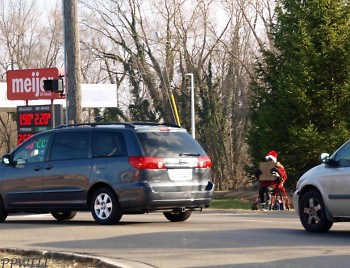
An individual with a walker holding up a cardboard sign outside of a gas station /PPWIII

An individual with a walker holding up a cardboard sign outside of a gas station /PPWIII
At its meeting on December 6, the Grand Rapids City Commission received and filed a communication from Joshua Lunger, the Vice President of Governmental Affairs at the Grand Rapids Chamber of Commerce. In this communication, the City Commission was urged to consider the adoption of two new ordinances that would "protect the health, safety, and well-being" of Grand Rapidians by making it illegal for people to:
This proposal recommends that individuals who violate these ordinances receive a fine of up to $100. According to the letter from the Chamber of Commerce, those caught sitting or lying in the public right-of-way should be given an initial warning by law enforcement before the fine is given. However, there is no recommendation that the same warning be given to individuals caught soliciting money in prohibited areas. Repeat offenders could face up to $500 in fines, 90 days in jail, probation, or any combination thereof.
The City Commission heard from numerous business owners and residents that supported these proposed ordinances at the December 6 meeting, including Rick Baker, President & CEO of the Grand Rapids Chamber of Commerce. At the podium, Baker expressed his support for the ordinances proposed by his organization, saying that:
"The ongoing concerns from residents and employers related to harassment, public defecation, trespassing, assault, and other disruptive and disturbing behavior needs to be addressed with an intentional and compassionate focus on improving outcomes for individuals experiencing homelessness or struggling with mental health. Addressing appropriate access and use of public right-of-way will encourage greater use of available resources while preventing unsafe and unhealthy conditions for unhoused individuals and all other stakeholders."
Though the communication states that these ordinances would not "criminalize homelessness," many residents expressed concern that these new rules would disproportionately affect and further marginalize the unhoused population in Grand Rapids. At the City Commission meeting held on Tuesday, December 13, several individuals took the podium to express their anger and frustration with both the Grand Rapids Chamber of Commerce and the Grand Rapids City Commission for not addressing the roots of the problem -- such as a lack of affordable housing and insufficient access to shelters, public restrooms, and mental health care. Dayja Tillman, a legal fellow with the American Civil Liberties Union (ACLU) of Michigan, took the podium to give an official statement from her organization on this issue:
"We at the ACLU of Michigan are deeply concerned with the Chamber's proposed ordinances, which specifically target people asking for help and who do not have housing... Sweeping these problems under the rug does not make them go away -- it's not a crime to be poor, it's not a crime to ask for charity, and it is not a crime to have nowhere else to go."
On Tuesday, the City of Grand Rapids sent out a press release to make it clear that, "after hearing directly from the public," they would not be adopting the new ordinances proposed by the Grand Rapids Chamber of Commerce. Instead, the City has decided to stick to the enforcement of existing ordinances that address some of the issues brought up by the Chamber of Commerce. Mark Washington, Grand Rapids City Manager, made the following statement in Tuesday's press release:
"During the pandemic, the City deprioritized non-violent misdemeanor offenses to reduce COVID exposures which coincided with a higher demand for critical resources that delayed response to some of the issues being identified. We are still deprioritizing non-violent offenses but are now prepared to resume more normal operations and redeploy our resources to address the more violent and criminal acts in key locations throughout the city. But let me be clear, we will not arrest our way out of homelessness and need more holistic approaches."
For more information about the ordinances proposed by the Grand Rapids Chamber of Commerce, click here. To watch the December 6 and December 13 City Commission meetings, check out the City of Grand Rapids' YouTube channel here and here.
The Rapidian, a program of the 501(c)3 nonprofit Community Media Center, relies on the community’s support to help cover the cost of training reporters and publishing content.
We need your help.
If each of our readers and content creators who values this community platform help support its creation and maintenance, The Rapidian can continue to educate and facilitate a conversation around issues for years to come.
Please support The Rapidian and make a contribution today.